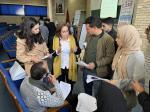My Nonprofit Reviews

YassineAlaoui
Review for High Atlas Foundation, New York, NY, USA
The Fight Against Human Trafficking
By Yassine Ismaili Alaoui, Legal Aid Clinician & Masters student of International Business Law
The Legal Clinic of the Faculty of Law in Fes, the National Commission in charge of the coordination of measures aimed at fighting and preventing human trafficking in the Kingdom of Morocco, and the European Council jointly organized a study and training in February 2022.
Human trafficking is a serious crime and a violation of human rights. It violates the human dignity of the victims and inflicts great suffering on them, in particular by using their vulnerable conditions to exploit them.
Trafficking is often associated with debates on migration, but in reality it is not only a transnational phenomenon; it is also a crime with a strong internal dimension.
The exploitation of women, men, and children in several economic sectors, both legal and illegal, makes human trafficking a complex phenomenon that is often difficult to detect; its elements merge with other phenomena and the practices of traffickers evolve and adapt to different contexts flexibly and dynamically. Moreover, the victims of the crime rarely define themselves as such and are in many cases not willing to file a complaint.
Paradoxically, it is often the victims of trafficking who are the focus of the authorities' attention, particularly when they are foreigners in an irregular situation or people exploited in prostitution or in illegal activities.
The February two-day training gave us a solid educational base on the different elements that can lead us to detect the crime of human trafficking.
The different speakers presented to us the institutional and legal framework, specifically the law 27-14 that allows institutions and Moroccan civil society to engage in the fight against trafficking in Morocco in a coherent and collaborative global response effort. In addition, the legislative framework also includes principles of the UN Palermo Protocol to prevent, suppress, and punish trafficking in persons, especially women and children, which defines this crime through the framework of three elements:
● An action: recruitment, transportation, transfer, reception, and accommodation.
● A means or a way: threat, coercion or use of force, abduction, abuse of authority or weakness, fraud or deception.
● A goal: exploitation; this can take on different forms, including pimping or sexual exploitation, forced labor (domestic, agricultural, or industrial), slavery or similar practices, servitude, obligation to commit crimes, organ removal, and trafficking.
The training also focused on the detection of a victim of human trafficking, which was facilitated by Mrs. Aicha Sakmassi, Executive Director of the association Voix des femmes. This section aimed at reinforcing the operational capacities of identification and legal assistance to victims of human trafficking, guided by someone with expertise and knowledge of working in this field.
The last part of the training was a simulation exercise of a human trafficking trial that put us participants on the ground of the practice and enlightened us on the course of the trial proceedings before a judge.
In conclusion, it is essential to address the root causes of human trafficking in the prevention of the phenomenon, those being poverty, exclusion, social inequality, and gender discrimination. It is vital to strengthen strategies to combat the factors that promote and allow for this phenomenon to occur. This is very important because without solving the economic and social problems and without strong prevention, repression and fight will never be enough.
Training workshop with clinicians to identify victims of trafficking and their protection mechanisms.
Photo credit: Abdellah Laaboudi, Legal Aid Assistant, CJFD.

